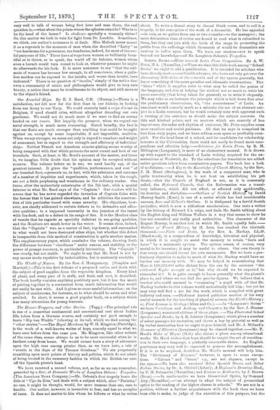We have received a second volume, not, as far as
we can remember, preceded by a firsf-, of Dramatic Works of Laughton Osborn: Tragedies. (The American News Company.)—Mr. Osborn's first tragedy boars the title of " Ugo da Este," and deals with a subject which, after "Parisina," no ono, it might be thought, would, for more reasons than one, care to handle. Our author, however, is insensible to fear, and has no scruples of taste. It does not matter to him whom he follows or what he writes
about. To write a dismal story in dismal blank verse, and to call it te tragedy, is his conception of the work of a dramatist. He has appealed —in vain, as wo gather from one or two remarks—to the managers ; the
more defenceless class of critics are bound to read what is submitted to' them, but they cad join with the lords of the stage in protecting the public from the sufferings which thousands of wonld-bo dramatists aro anxious to inflict upon them. We warn our readers—not to speak. beyond our knowledge—off Mr. Laughton Osborn's Tragedies.






























 Previous page
Previous page